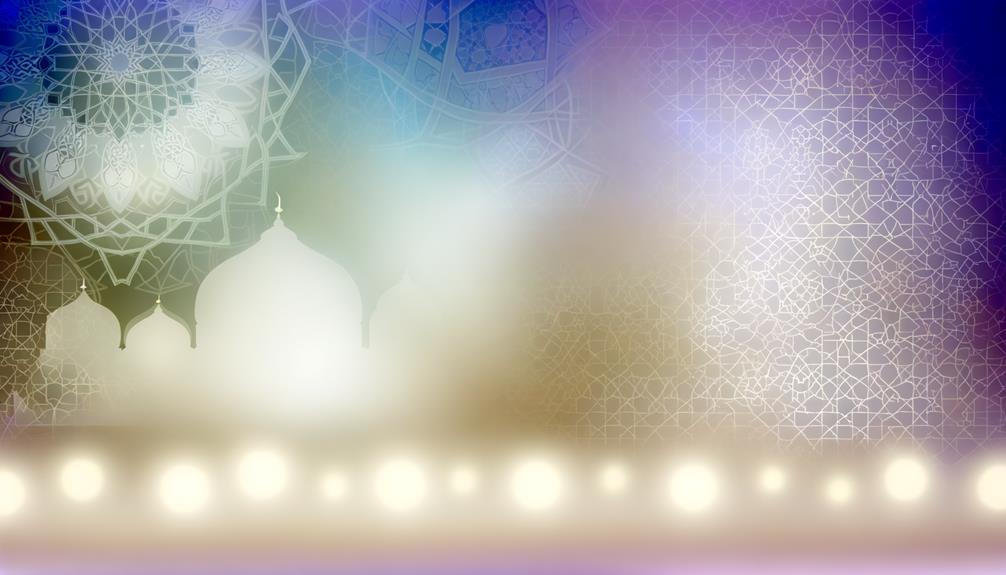Maria Name Meaning in Islam
The name Maria in Islam is intricately linked to Maria al-Qibtiyya, a revered companion of the Prophet Muhammad. Originally an Egyptian Coptic Christian, she embraced Islam and is noted for her purity, compassion, and devotion.
Her name, derived from the Hebrew Miriam, signifies 'beloved' and is associated with virtues like empathy and patience in Islamic teachings. Maria's story exemplifies the inclusive nature of early Islamic society and her contributions are well-documented in Hadith collections.
Her significance extends beyond history, embodying values respected universally. Exploring further will reveal the rich cultural and spiritual connotations associated with Maria in Islam.

Key Takeaways
- Maria in Islam is associated with Maria al-Qibtiyya, a revered companion of Prophet Muhammad.
- The name connotes purity, gentleness, and compassion in Arabic.
- Maria al-Qibtiyya's story reflects the diverse and inclusive nature of early Islamic society.
- She is remembered for her loyalty and respect within the early Muslim community.
- The name symbolizes virtues like patience, humility, and piety in Islamic teachings.
Origins of the Name Maria
The name Maria has a rich and diverse history, rooted in various cultures and languages. It is derived from the Hebrew name Miriam, which has ancient origins in the Semitic languages.
The name has been widely adopted in various forms across different cultures, including Latin, Greek, and Aramaic. In Christianity, Maria is a revered name, often associated with the Virgin Mary.
Its meaning varies, often interpreted as 'bitter,' 'beloved,' or 'wished-for child.' The name's widespread use in Europe, particularly in Spanish and Portuguese-speaking countries, underscores its cultural significance.
Historically, Maria has been a prominent name, symbolizing purity and virtue, and continues to be a popular choice in many societies worldwide.
Historical Significance in Islam
In Islamic history, the name Maria holds significant importance, particularly due to its association with Maria al-Qibtiyya, one of the wives of the Prophet Muhammad.
Maria al-Qibtiyya was an Egyptian Coptic Christian who was gifted to the Prophet Muhammad by the Byzantine ruler of Egypt. She later embraced Islam and bore the Prophet a son named Ibrahim, who, although he died in infancy, remains a revered figure.
Maria al-Qibtiyya is remembered for her devotion and respected position within the Prophet's household. Her story exemplifies the inclusive and diverse nature of early Islamic society, where individuals from various backgrounds and faiths contributed to the community's spiritual and social fabric.
Linguistic Roots and Meanings
Deriving from the Hebrew name Miriam, Maria is a name that has been adopted and adapted across various cultures and languages, carrying profound meanings and connotations within Islamic tradition. In the Arabic language, Maria (ماريا) connotes purity and gentleness, aligning with the values esteemed in Islamic culture. The name also finds resonance in other linguistic traditions, each adding layers of meaning. In the Persian tradition, Maria is associated with the concepts of love and compassion. In the Turkish language, the name carries the meaning of grace and elegance. Additionally, Maria holds significance in the anna meaning in Islam, as it is commonly believed to be the name of the mother of Isa (Jesus) in Islamic tradition. The name Maria continues to be cherished and revered across various cultures and faiths, symbolizing virtues and values that transcend linguistic and cultural boundaries.
| Language/Culture | Meaning |
|---|---|
| Hebrew | Beloved, wished-for child |
| Arabic | Purity, gentleness |
| Latin | Sea of bitterness |
| Greek | Rebellion |
This rich tapestry of meanings underscores the universal appeal and reverence for the name Maria, transcending cultural and linguistic boundaries while retaining a deep connection to its roots.
Maria in Islamic Texts
Within Islamic texts, the name Maria holds significant historical and spiritual relevance, primarily through the figure of Maria al-Qibtiyya, a revered companion of the Prophet Muhammad.
Maria al-Qibtiyya was an Egyptian Coptic Christian who was gifted to the Prophet and later embraced Islam. She bore the Prophet a son, Ibrahim, who sadly passed away in infancy. Her conversion and close association with the Prophet highlight her esteemed status within the early Muslim community.
Maria al-Qibtiyya is often remembered for her loyalty and the profound respect she garnered from the Prophet and his followers. Her story is documented in various Hadith collections, emphasizing her role and the meaning her name carries within Islamic heritage.
Attributes and Virtues
In examining the attributes and virtues associated with the name Maria within Islamic tradition, it is essential to highlight characteristics such as purity, compassion, and devotion.
These qualities are not only reflective of the spiritual significance of the name but also resonate with the values upheld in Islamic teachings.
Understanding these attributes provides a deeper appreciation of the name's meaning and its revered status.
Characteristics of Maria
Maria, as a name in Islamic culture, often embodies attributes such as kindness, compassion, and piety. These characteristics are believed to reflect the essence of a person named Maria, aligning with the values esteemed in Islam.
Individuals named Maria are often perceived as nurturing and empathetic, traits that foster strong interpersonal relationships and community bonds. Additionally, the name carries a connotation of spiritual devotion and integrity, underscoring a commitment to faith and moral principles.
The virtues of patience and humility are also associated with Maria, suggesting a balanced demeanor that harmonizes personal conduct with Islamic teachings. These qualities make the name Maria highly regarded, symbolizing a harmonious blend of inner strength and outward benevolence.
Spiritual Significance Explained
The spiritual significance of the name Maria in Islamic culture is deeply intertwined with attributes and virtues that reflect a profound commitment to faith and moral integrity. Maria, often associated with the Virgin Mary (Maryam in Arabic), embodies qualities that Muslims hold in high regard.
- Purity and Chastity: Maria symbolizes a life led with moral clarity and ethical conduct, mirroring the revered figure of Maryam in Islamic tradition.
- Devotion and Piety: The name signifies a deep spiritual connection and unwavering devotion to God, echoing Maryam's devoutness.
- Compassion and Humility: Maria represents kindness and humility, qualities exemplified by Maryam, who is honored for her gentle and compassionate nature.
These virtues encapsulate the esteemed spiritual essence of the name Maria in Islam.
Popularity Among Muslim Families
Among Muslim families, the name Maria enjoys significant popularity due to its historical and cultural resonance. Rooted in both Islamic tradition and broader historical contexts, Maria is often chosen for its connection to revered figures such as Maria al-Qibtiyya, a wife of Prophet Muhammad (PBUH).
This historical linkage not only endows the name with a sense of respect but also imbues it with a timeless quality. Additionally, the name Maria is appreciated for its phonetic simplicity and cross-cultural appeal, making it a versatile choice in diverse communities.
Its enduring popularity reflects a blend of tradition and modernity, embodying values cherished in many Muslim households. This widespread acceptance underscores the name's significant cultural footprint within the Islamic world.
Cultural and Spiritual Connotations
In Islamic tradition, the name Maria carries profound cultural and spiritual connotations that extend beyond its historical significance. It is revered not only for its association with Mariam (Mary), the mother of Prophet Isa (Jesus), but also for its evocative meanings in the Arabic language, which include purity and beloved.
These connotations are further enriched through various aspects:
- Spiritual Symbolism: Maria symbolizes purity and devotion, reflecting qualities highly esteemed in Islamic teachings.
- Cultural Integration: The name bridges cultural gaps, being embraced by diverse Muslim communities worldwide.
- Historical Reverence: Its ties to significant religious figures enhance its spiritual resonance, making it a name of honor and respect.
Thus, Maria embodies a blend of cultural depth and spiritual purity in Islamic contexts.
Conclusion
In conclusion, the name Maria, while bearing rich historical and linguistic roots, finds a unique resonance within Islamic tradition. Its frequent mention in Islamic texts and its association with virtues and attributes make it a cherished choice among Muslim families.
The name carries cultural and spiritual connotations that transcend mere nomenclature, embedding itself deeply in the fabric of Islamic identity. Therefore, Maria remains a testimony to the enduring legacy of names that bridge history and faith.






